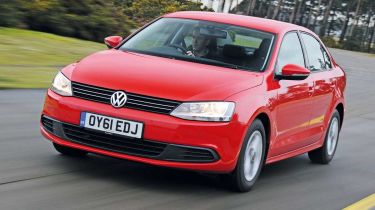VW Jetta
Will premium brand quality count in the face of new rivals?
If you want an alternative to the usual saloon suspects, the VW Jetta is a prime candidate. It basks in the glow of the larger Passat and shares most of its mechanicals with the superb Golf – and it closely matches the i40 and Optima for space and practicality.
However, if you plan to choose your next saloon purely on style, the Jetta will come up short. Inventive design flourishes give the Hyundai and Kia real individuality, but the Jetta is simple to the point of boredom.
It’s well proportioned, yet the unflattering 16-inch alloy wheels (and winter tyres) meant that our test car looked anonymous, even with its bright red paint finish.
Inside, VWs usually enjoy an advantage over their rivals, but things don’t improve much here. Although the low driving position is the best in this test, the cheap stepped manual seatback adjuster is a bit of a shock after spending time in the i40.
Similarly, while the tactile controls feel solidly built, in areas such as the door panels the Mexican-built Jetta’s fit and finish isn’t up to scratch. The familiar layout is easy to use, yet there’s nothing in here to make the driver feel special, unlike in the i40.
Used - available now

2024 Land Rover
Defender 110
1,226 milesAutomaticDiesel3.0L
Cash £67,960
2022 Skoda
Karoq
1,780 milesAutomaticPetrol1.5L
Cash £18,100
2020 Land Rover
Range Rover Evoque
30,000 milesManualDiesel2.0L
Cash £17,800
2023 Jaguar
I-PACE
35,954 milesAutomaticElectric
Cash £24,200The VW does have one trick up its sleeve, though: clever packaging. Even though it’s the shortest car here by some margin, it has only 20mm less rear legroom than the Kia, and better headroom thanks to a higher roof.
Likewise, the 510-litre boot is the widest of the three and the lip is the lowest, making loading bulkier items more simple. There are also dividing pockets for small items either side of the main luggage area, and even a ski hatch through the rear armrest.
However, the VW’s trump card is not this hidden practicality, or even its in-built dependability. It’s the way the car drives. The 2.0-litre TDI engine is smoother, revs harder and has a wider powerband than the 1.7-litre in the other cars. Damp conditions and low temperatures played into the hands of our Jetta’s winter tyres, and although it had the quickest 0-60mph time, at 9.6 seconds, longer gearing means it feels more relaxed accelerating in-gear on the motorway.
Weighty, accurate steering and better front grip make a big difference on twisting roads, too, and the Jetta seems more planted and assured than its rivals here, striking the best ride and handling balance. Body roll is more tightly controlled than in the i40, and the VW remains unflustered under hard cornering. Yet while it’s satisfying to drive, it’s capable rather than rewarding or engaging.
Don’t be fooled by the premium badge, as our £20,435 SE is cheaper than its rivals on test, undercutting the i40 by £560. However, if you add options such as sat-nav and parking sensors to get a similar spec to the Hyundai or Kia, it begins to look less appealing.
Still, the VW emits the least CO2 here, and makes a tempting – if bland – company car purchase. Can it overcome the style of the Hyundai and the kit in the Optima?
Details
Chart position: 3
WHY: Often overlooked in favour of the bigger Passat, the Jetta comes with a similar pedigree and cultured dynamics for less. But will its small size count against it?







